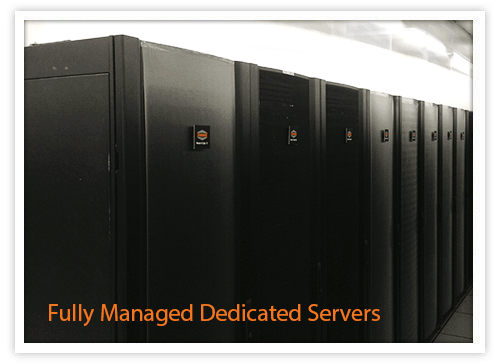
HostDime offers a plethora of fully managed dedicated servers, from entry level to the most advanced, high-performance servers in the industry. HostDime is committed to offering intelligent managed dedicated server solutions by implementing the latest technologies. This guide will help you understand what’s under the hood of our new dedicated servers so you can better choose which specific server fits your unique needs.
What Does Fully Managed Dedicated Servers Mean?
A fully managed dedicated server means HostDime takes care of setting up your completely customizable server, the troubleshooting, and everything in between. In most cases, HostDime does not charge hourly support rates like other hosting companies. Each server is set up to ensure your machine is ready to launch any type of website. HostDime’s talented technicians perform a 10 point security audit on every server to prevent web hacking. Full client support is available 24/7/365 via email, live-chat, and phone.
The primary advantage of having dedicated hosting over a shared account is the large amount of resources and control available. The client can install whatever custom software they desire, giving them greater flexibility and administrative options. However, HostDime does not always install 3rd party software free of charge, nor offer support for these installs. If the third party software is not covered by the Service Level Agreement, it is up to you to keep these up to date so you are not at risk of hacking.
Dedicated server clients do not share resources like shared hosting, rather are at liberty to use all the resources available to them. This is ideal for businesses growing too large and successful to remain in the confines of a shared environment.
While basic managed dedicated servers come with hardware & network support, fully managed comes with much more. Clients need different things to accommodate their needs so this is just a sampling of what fully managed means:
– Kernel Upgrades, OS patches
– Backups and restoration help, on servers with two or more drives
– Cpanel/WHM updates
– PHP updates
– MySQL updates
– System pre-installed services updates (no 3rd party scripts installed)
– WHM/Cpanel assistance including creating, deleting, setting up, email and DNS
– PHP compilation
– MySQL optimization
– SSL configuration and installation
– Custom DNS configuration
– Email troubleshooting
– FTP troubleshooting
– High server load troubleshooting
– Best Effort Third Party Application Support
– Hardware replacement SLA 2-6 hours
– Compromised Server Recovery
– Software firewall installation and configuration
– Failed drive service restoration of all accounts
– Database corruption assistance
– Assistance with system alerts or warnings
– Hands on help with pre-install system settings
– High bandwidth consultation needs
Ask Yourself These Questions Before Picking a Dedicated Server
Choose a dedicated server that is tailored to your specific needs. Ask yourself these seven questions before picking which server is right for you:
1) Do you have a specific monthly budget in mind?
2) Which OS do you need (Linux or Windows)?
3) Will you need a web based control panel (cPanel or plesk)?
4) What are your intentions for the server?
5) Do you plan on hosting a single site, or multiple sites? Are you looking to sell hosting?
6) How much traffic are you expecting?
7) Do you require a multiple drive setup for a RAID configuration or cPanel backups?
What’s Under the Hood of a HostDime Dedicated Server
HostDime’s new lineup of Intel processors features top of the line CPU models, newer powerful processor technology, and advanced functionality. The Core i3, i5 and i7 processors, along with the extremely powerful Hexa-core (6 cores per cpu) Xeon series, are sure to give your server a boost in performance. The new processors are more economical and less power hungry, so you receive more processing power for a smaller price. Check out HostDime’s full Intel product line, along with Wiki’s comparison of Intel processors.
Each CPU “core” is a separate central processing unit, which is the portion of the CPU that actually does the heavy lifting. Additional central processing units allow a computer to do multiple things at once. Phrases like “dual core”, “quad core”, and “octo core” all refer to the number of cores a CPU has.
Dual Core: Two cores.
Quad Core: Four cores.
Hexa Core: Six cores.
Octo Core: Eight cores.
Deca Core: Ten cores.
All of these options can have double the amount of cores thanks to “hyperthreading”. Hyperthreading is an Intel-created technology that enables multi-threaded software applications to execute threads parallel on a single multi-core processor instead of processing threads in a linear fashion. Therefore:
2 x Quad-Core Xeon E5520 2.26GHz w/HT has 16 CPUs.
2 x Hexa-Core E5-2620 2.0 Ghz w/HT has 24 CPUs.
2 x Octo-Core E5-2670 2.6 Ghz w/HT has 32 CPUs.
Say you’re browsing the web and extracting an archive file at the same time. If you had a single-core CPU in your computer, your web activities would be slightly delayed. The single core would have to split its time between web browsing and file-extraction tasks. If you had a dual-core CPU with two cores, one core would work on extracting the file while the other core did your web-browsing work. Web browsing and caching would be faster and more responsive with multiple cores.
When purchasing a new server, a good rule of thumb is to buy a processor that fits your budget. You can always upgrade memory, get speedier storage, or include a RAID array in the future should your server slow down.
If you have any questions about our new hardware line, would like to sign up for a new server, or upgrade an old one, please don’t hesitate to contact us.
[divider]
This article was written by HostDime’s Content Marketer Jared Smith, with help from talented HostDime dedicated server specialist Carlos P.
